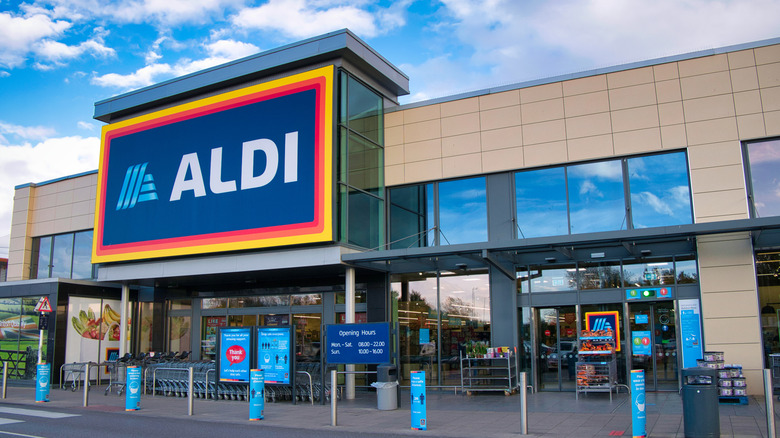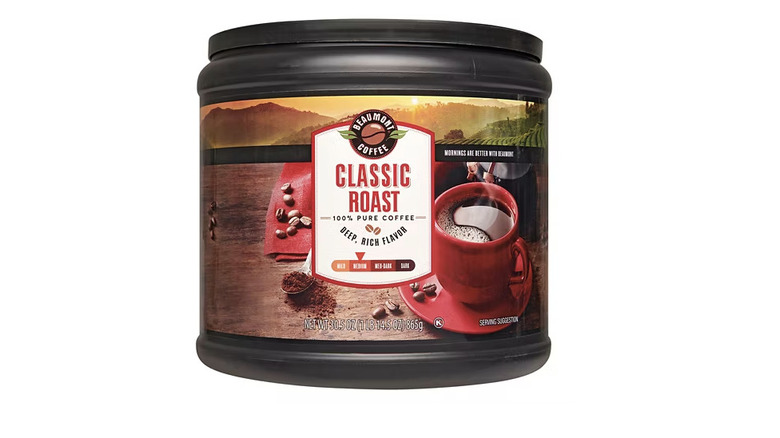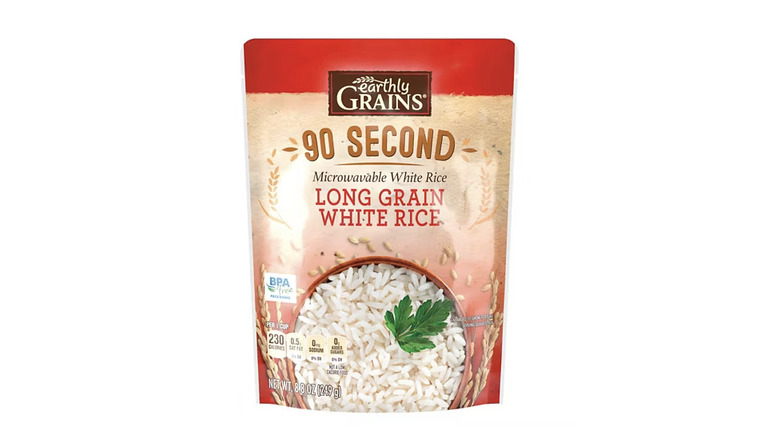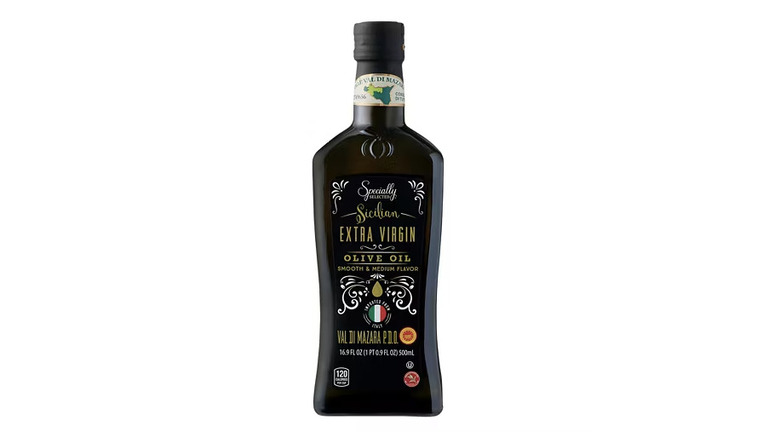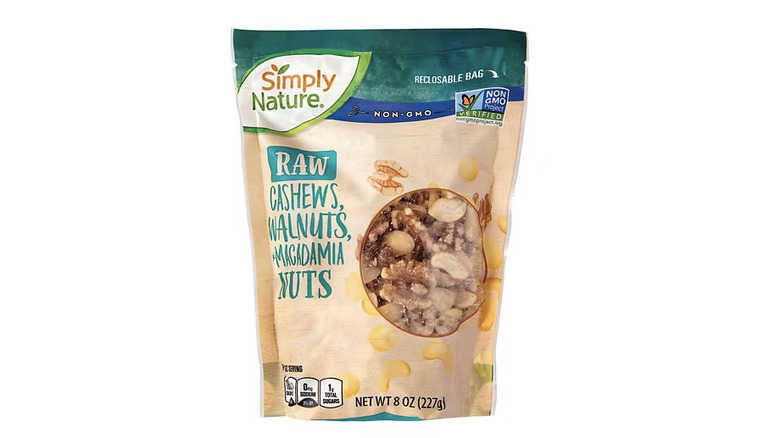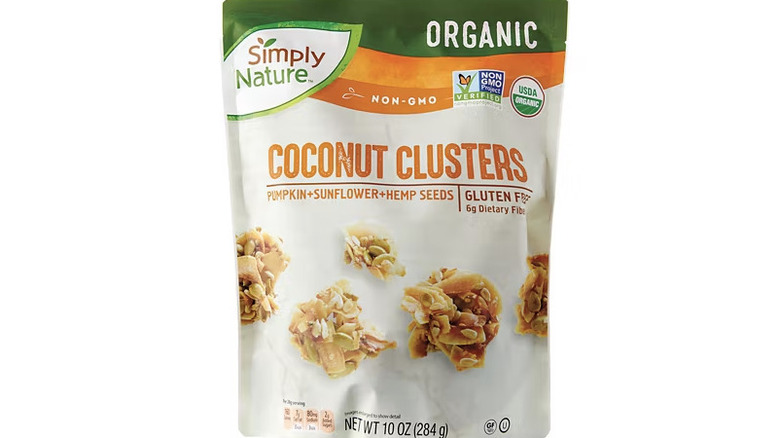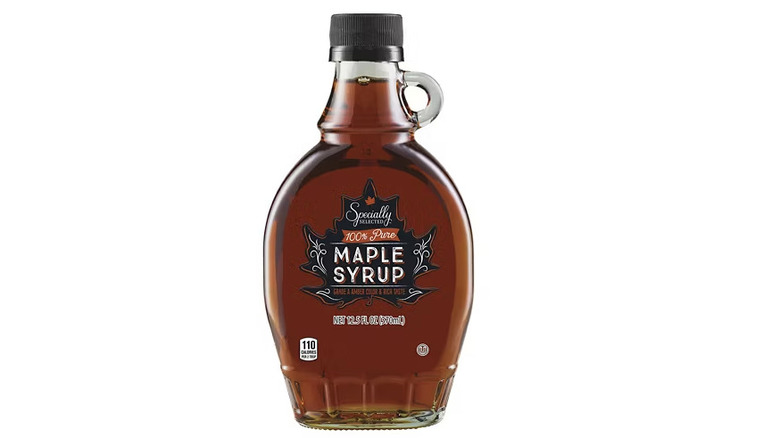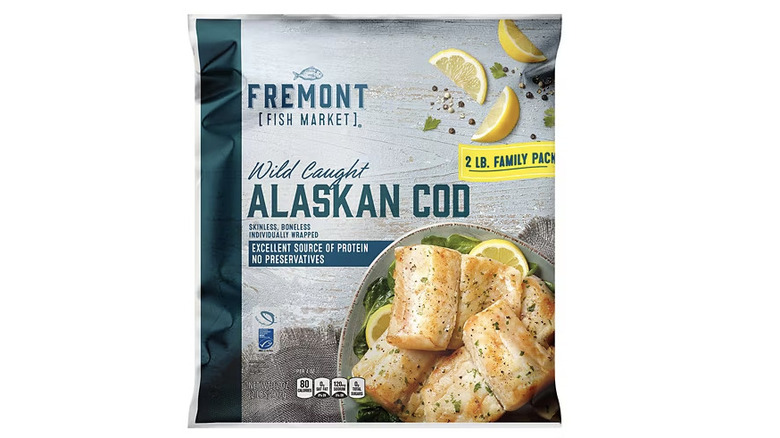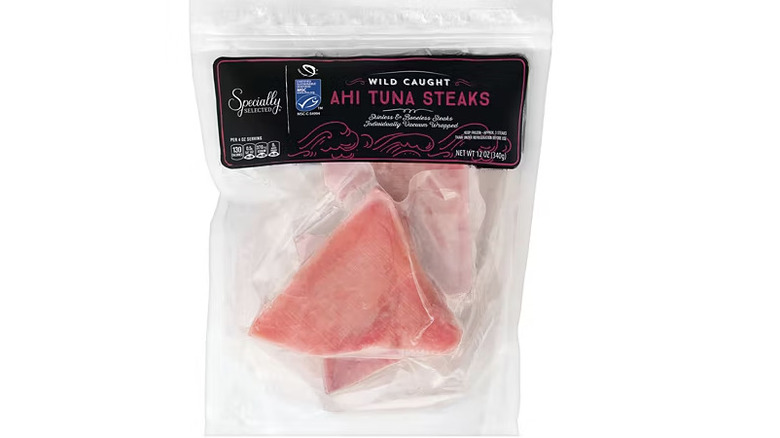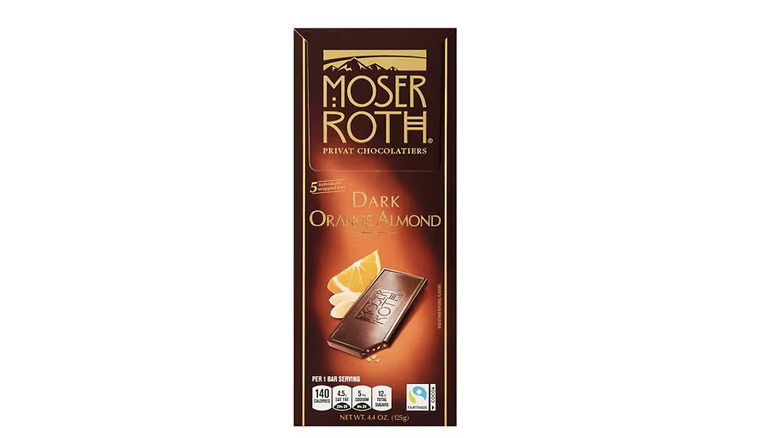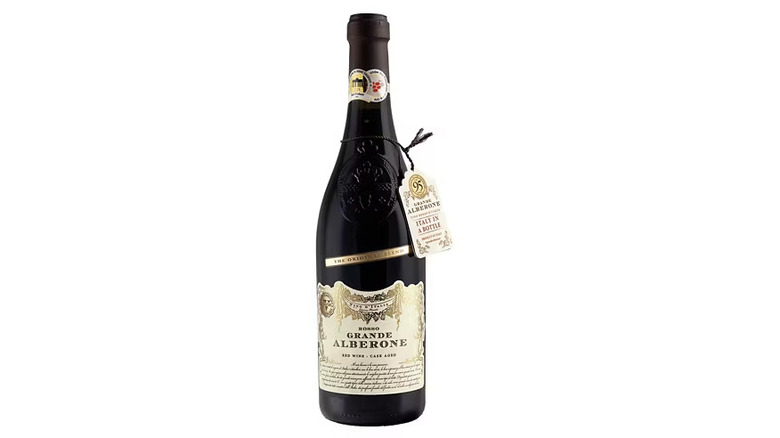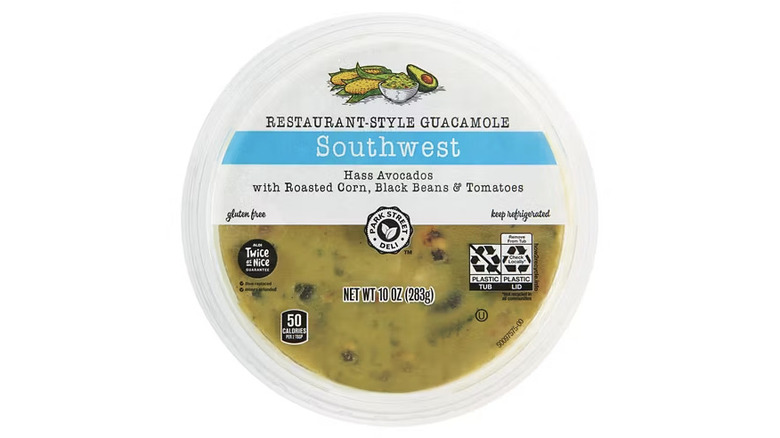12 Aldi Groceries That Might Shoot Up In Price
The turmoil in the global economy may feel like a distant issue, but its consequences are soon to hit our grocery store shelves and our beloved wallets. Global tariffs levied by the Trump administration made the price of importing goods to the United States more expensive for many countries. You may not know it, but your grocery list is likely packed with tasty imported foods that are difficult to source in America.
Additionally climate conditions have led to multiple food shortages across the globe. No grocery store is immune to global imports and Aldi shoppers may feel their hearts drop to their stomachs when they see the prices of their beloved items. Aldi is a melting pot of world delicacies, but this may be to its detriment in the current economic climate. According to The Observatory of Economic Complexity, the majority of Aldi's products originate in China, a country that was experiencing an unbelievable 145% tariffs until May 12, 2025, when that number dropped 30%.
When budgeting your upcoming Aldi grocery trips, be aware of these imported items that may undergo a change in price. Starting your day with a trusty cup of coffee and ending it with a relaxing glass of wine may look more expensive than it did last month.
1. Beaumont Coffee
Beaumont Coffee is a staple on Aldi shelves that fills the coffee pots of homes across America. However, America is not the singular home of Beaumont Coffee. Some of the brand's coffee originates in the United States, but it is also an imported good.
Coffee beans are largely cultivated abroad due to the conditions necessary to grow Coffea plants. Tropical climates are vital to the growth of coffee beans, making countries closer to the equator ideal for coffee farming. The Coffee Belt is a belt following the equator where most coffee is grown, including parts of Southern North America, South America, Africa, Asia, and Australia. The biggest coffee bean producer in the world is Brazil, producing an impressive 38% of the world's coffee. Brazil is facing the baseline 10% tariff imposed on all countries by the U.S.
Although some Beaumont Coffee is manufactured in America, it is very likely the majority of the company's coffee beans are imports. Due to this, even domestically manufactured coffees like Beaumont, may see a rise in prices.
2. Earthly Grains Rice
Earthly Grains Rice is a delicious easy meal to cook up in under five minutes following a long day. This convenience may be curbed by a potential incoming price jump. Earthly Grains is produced in Canada, and could face tariffs.
Although the tariffs are no longer on all Canadian imports, a 25% tariff is applied to all products that do not meet the standards of the United States-Mexico-Canada Agreement (USMCA). In order to avoid this tax, all the ingredients in Earthly Grains products would have to be sourced in North America.
While it is hard to pin down the source of Earthly Grains Rice, the answer is more than likely that it is found outside of the continent. The vast majority of global rice production occurs in Asia, primarily China and India. China is currently facing a steep 30% U.S. tariff.
However, some rice is produced in Mexico and America. Over 7 million metric tons of rice were produced in North America in the last year. China alone produced over 145 million metric tons of rice over the same period, putting North America's output to shame. Despite this, it is still possible this product could avoid tariffs with proper ingredient sourcing.
3. Specially Selected Sicilian Olive Oil
Specially Selected Sicilian Olive Oil is one product that better be imported. Sicilian is right in the name, it would be a shame to find out that the olives were grown in American soil. I am happy to report that this product is in fact imported, but unfortunately it will not be excluded from U.S. tariffs.
Olives are primarily grown in Southern European countries, like Italy. The bitter cold is not good for the growth of olive trees nor do the trees benefit from moisture. Olive trees wouldn't thrive in many parts of America, so olives are primarily imported.
Italy has a 10% tariff imposed on its imports to the United States as a part of the European Union. This product is specifically created with Sicilian olives, but other olive oils created with European Union olives face the same tariff. Olive oil is a kitchen staple, so the price of olive oil increasing makes cooking anything at home slightly more expensive.
4. Simply Nature Nuts
I can't think of a better midday snack than a delicious handful of trail mix. Nuts contribute to so many delicious treats, sauces, and spreads that it is tragic to think about the prospect of their price going through the roof.
Nuts are sourced largely abroad: Cashews, pecans, and macadamia nuts in particular are at risk of jumping in price. Nuts are imported to the United States primarily from Vietnam, the Ivory Coast, Brazil, and Thailand. Vietnam's exports are subject to high tariffs at 46%, Thailand and the Ivory Coast are not far behind this rate with tariffs that far exceed the 10% baseline for all countries.
Simply Nature nut products face an interesting issue. One of Aldi's tier-1 nut suppliers is Redlands Food Corps, a Canadian company. Even if the nuts are not shipped from Vietnam or Thailand directly to the U.S., the Canadian-sourced nuts may face 25% tariffs coming in from the North.
5. Simply Nature Coconut Clusters
This crunchy simple snack is not only a cluster of flavor, but a cluster of money. This product contains many ingredients that may see an increase in price in the coming weeks. Not only are many ingredients contained in each cluster imported, these ingredients face unique environmental issues.
Coconut clusters of course contain smooth morsels of coconut, but this is an issue for those on a strict budget. There is a coconut shortage globally that affects the availability of the fruit, making it difficult to satisfy consumer demand. Southeast Asian agriculture is struggling in what are called El Niño weather patterns. El Niños raise temperature as a warm front pushes through the region and dries up the land. This can cause droughts, which do not bode well for the health of growing plants.
Pumpkin seeds are also a large part of what makes this snack so irresistible, and pumpkins are largely produced in China. But, these coconut clusters are a product of Canada, another country facing potential tariffs. It will be a miracle if these bite-sized treats are unscathed!
6. Specially Selected Maple Syrup
Maple syrup is perhaps the closest to the nectar of the Greek Gods that we have discovered on our mortal plain. The golden perfection that is maple syrup is incredibly versatile from a pancake topping to the perfect bacon glaze, it does it all. There is no price I am not willing to pay for maple syrup, but current affairs may put that proclamation to the test.
Maple syrup is of course deeply associated with our neighbors to the north, Canada. About 75% of maple syrup is produced in Canada. Specially Selected is no exception, some is made in the United States, but a sizable portion is also made abroad. As of the writing of this article, the syrup may be safe. Distilling maple syrup is a long process of boiling off the water from sap and then bottling the sugary goodness that remains. This means that maple syrup may contain products made solely in North America and fit the requirements of USMCA trade agreements. However, it is impossible to say if the United States will continue to honor this stipulation as time goes on. Keep an eye on the price of your syrup, and if you're from the Northeast, consider buying from local farmers instead.
7. Fremont Fish Market Wild Caught Alaskan Cod
Fremont Fish Market serves up delicious frozen fish at Aldi. The seafood at Aldi has been historically inexpensive, but that streak may be over. Before the tariffs this may have been the perfect protein to center your dinner around, but now fish are at risk of hurting your wallet. According to the USDA, America imports way more seafood than it exports.
The largest suppliers of fish in the world are facing significant tariffs at the moment. Canada, Chile, Vietnam, India, and Indonesia are facing tariffs ranging from 10% to 46%. This does not bode well for fish tacos and surf and turf.
Fremont Fish Market Alaskan Cod is particularly a product of China according to its packaging. As of this writing, China is facing 30% tariffs for the next 90 days. However, after this three-month period, the higher tariffs on China could potentially return. Only days ago imports from China faced 145% tariffs. When you're buying fish for the next few months at Aldi, keep an eye on the price tag.
8. Specially Selected Wild Caught Ahi Tuna
The Specially Selected brand also dabbles in seafood. Aldi shoppers can snag a large Ahi tuna steak from the seafood section, but where did Aldi get the fish? Specially Selected sources from outside U.S. waters.
Specially Selected Ahi Tuna is a product of Vietnam. The vast Vietnam coastline lends itself perfectly to fishing and aquaculture. Large hauls of fish are shipped from Vietnam all over the world, and the United States is a large buyer. Approximately 4.2% of American imports come from Vietnam, although it is of course not all fish. Vietnam is currently facing a 10% tariff, but was originally threatened with a hefty 46% tariff.
As it currently stands, this product may be more expensive, but Aldi shoppers have lucked out. The state of the tariffs on this product could have been four times the current rate. If the tariff increases, it would be amazing Ahi tuna did not skyrocket in price in Aldi freezers.
9. Moser Roth Chocolate
One of the greatest products at Aldi has to be the chocolate. Aldi is a German company, and Germany is the world's leader in chocolate exports. Rich creamy chocolate is a great pride of Germany, and Aldi's Moser Roth chocolate is meeting expectations.
Moser Roth chocolate is the perfect sweet treat as a reward for your long working day. However it may start to eat up your hard earned cash, because Germany is facing a 10% tariff importing to the United States. Of course Moser Roth is labeled a product of Germany, it is a given that Aldi would source delicious German chocolate.
However, Moser Roth is not alone. You may think that simply switching to a United States chocolate supplier will solve all your chocolate problems, but it is not that easy. Even if the chocolate is truly manufactured in America and not Germany, it is important to consider where the cocoa beans come from. The answer is likely Africa, 74% of the world's cocoa beans come from the continent, with the country Côte d'lvoire producing the largest share. The baseline 10% tariff will affect any country in Africa importing their cocoa beans to America, making production of chocolate more expensive for American companies.
10. Grande Alberone Wine
The brand Grande Alberone can be found at Aldi and hails from Italy, as many wines worth their salt do. Grande Alberone may be your go-to wine to pair with delicious meats and cheeses, but it may be time to consider switching to a California red. All imports are unfortunately at risk of a price increase.
As aforementioned, Italy is facing a 10% tariff on imports into the United States. As a part of the European Union, Italy was previously threatened with a 20% tariff, so it could be worse. Alcoholic products are largely imported from the European Union, so wine is not alone in feeling the heat.
However, all is not lost. Many wine brands that line the shelves of Aldi are produced domestically in the United States. If Grande Alberone increases in price and you're looking for an alternative, California Heritage Wine is a domestic product and therefore at lower risk of a price increase.
11. Park Street Deli Guacamole
Park Street Deli is a beloved Aldi brand and staple. It is hard to find a dip that is not sold by the brand. Its Southwest guacamole is one of its greatest products, but producing the dip at the usual cost may be difficult.
Guacamole is the greatest gift given to us by avocados, but avocados are not primarily grown in America. Most avocados in America come from Mexico which is one of the largest producers of the fruit globally. However, as previously mentioned, products from Mexico and Canada may escape tariffs if they are composed of North American resources only. Avocados do not have added ingredients, so the outlook is good! However, if they are not able to forgo the tariffs, a 25% tariff will hit all avocados from Mexico.
On the bright side, many avocados are actually produced in California and Hawaii. It is entirely possible that Park Street Deli is able to make its guacamole with American produced ingredients. It is wise to keep an eye on the price, but lovers of Aldi's guacamole may be safe from increased prices.
12. Canned Beers
As summer approaches it is time to crack open a cold one to pair with your burgers and hot dogs fresh off the grill. However, you might want to consider switching to bottled beer, because canned beer is going to be hit hard by the tariffs.
Canned beer may jump in price whether the beer is grown, brewed, and canned in America. This time it is not the food or drink that is being taxed, but the container. Beer cans are made of aluminum, making them sturdy, easily transported, and recyclable. Unfortunately, aluminum and steel are facing tariffs of their own. All aluminum imports to the United States have a 25% tariff.
The tariffs are an attempt to bolster American steel and aluminum manufacturing. If a beer company is able to source all of its aluminum cans from America, its prices still may not stay the same, but this can be difficult. There is not necessarily enough American aluminum to go around. If the demand for American aluminum becomes greater than the supply, prices would still increase.
